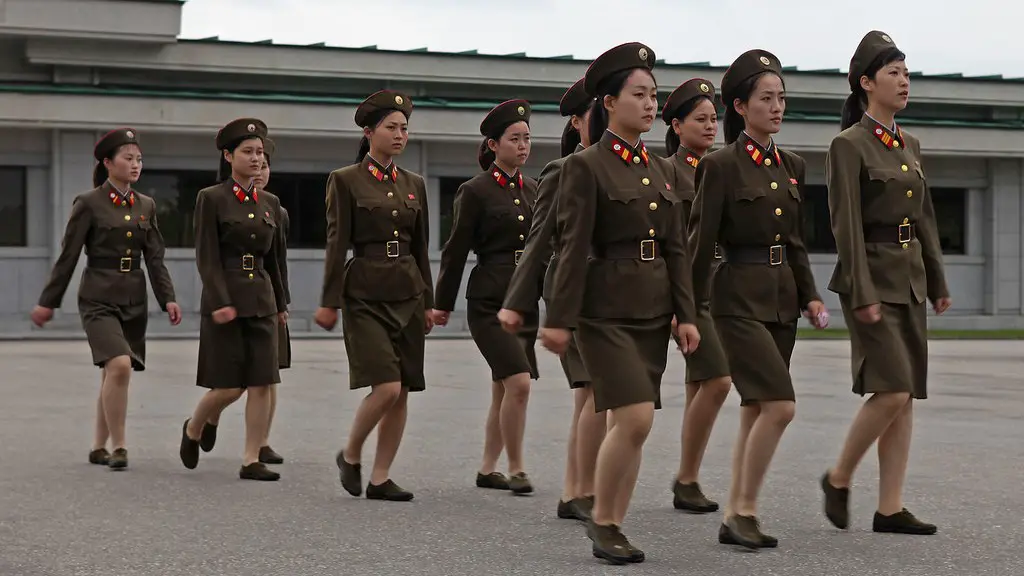Overview
Would China ever invade North Korea? China’s relations with its neighbor, North Korea, have long been an area of deep interest and scrutiny. Over the years, China has been involved in multiple political and military interventions in the Korean Peninsula to maintain or increase its influence there. North Korea has been a major area of concern for the Chinese government, which is seeking to ensure its own security in the region. But would China ever go as far as to invade North Korea? In this article, we will discuss the various factors which influence China’s decision on whether or not to invade North Korea, including strategic and economic interests, historical relations, and the current state of affairs between the two countries.
China’s Strategic Interests in North Korea
To understand why China has chosen not to invade North Korea, one must first consider the strategic interests that China could benefit from if it were to maintain a stable and friendly relationship with North Korea. China’s primary interest in North Korea is as an ally in its own geopolitical and strategic maneuver. North Korea can offer China an invaluable buffer zone against its potential enemies in the region, such as South Korea, Japan, and the United States. By maintaining a close relationship with North Korea, China can ensure that it will be able to protect its own citizens in the event of any conflict in the region, as well as prevent the emergence of a hostile neighbor on its borders.
In addition, China has a great deal of economic interests in North Korea. North Korea has a large natural resource base, as well as numerous ports and harbors that can facilitate trade between the two countries. By maintaining a good relationship with North Korea, China can ensure access to these resources and facilitate the growth of trade between the two countries. China is also keen to expand its influence in the region, and a close relationship with North Korea can help it achieve this goal.
Historical Relations Between the Two Nations
When it comes to deciding whether or not to invade North Korea, China also takes into account its long-standing relationship with the country. Historically, China has been a major influence in the Korean Peninsula, playing a role in both supporting and isolating North Korea. After World War II ended and both North and South Korea became established as separate countries, China maintained close ties with both sides and played an essential role in mediating disputes between them. China has since continued to support the North Korean government and played a major role in the peace process that has emerged since the end of the Korean War.
However, despite their historical ties, China has also been critical of North Korea’s policies in the past. China has publicly condemned North Korea’s nuclear weapons and ballistic missile development, as well as its human rights abuses and oppressive government. In recent years, China has taken a tougher stance on North Korea and imposed significant economic penalties in response to its provocative actions. As such, it is clear that China does not always agree with the policies pursued by the North Korean government.
Effect of US-China Conflict
Another important factor in China’s decision not to invade North Korea is the current tensions between China and the United States. The US-China trade war has seen both sides imposing tariffs on each other’s imports, as well as taking a range of other measures to damage each other’s economy. As a result, the United States has become increasingly aggressive towards China, and is now looking to isolate the country in the international arena. As such, it is likely that the US would be strongly opposed to a Chinese invasion of North Korea, and would likely threaten to retaliate if it happened. As a result, China is likely to be reluctant to take the risk of such a move.
In addition, China is also likely to be concerned about the potential repercussions of a conflict with the United States over North Korea. Any conflict between the two countries could potentially escalate into a major global conflict, and could lead to a U.S. military presence closer to China’s own borders. These combined factors mean that China is likely to be reluctant to initiate a conflict with North Korea unless it is absolutely necessary.
United Nations’ Role
The United Nations has also been involved in the North Korean conflict, and has managed to maintain a fragile peace between North Korea and its neighbors. The United Nations has imposed a range of sanctions on North Korea in response to its nuclear weapons and ballistic missile programs, and has also been involved in the diplomatic process that has sought to reach an agreement on the denuclearization of the Korean Peninsula. As such, any Chinese invasion of North Korea would almost certainly be opposed by the United Nations and could lead to further sanctions on the Chinese government.
The United Nations has also taken a strong stance against any military action in the Korean Peninsula, and has consistently called for a peaceful resolution to the conflict. As such, any Chinese invasion of North Korea would likely be viewed as contrary to the United Nations’ efforts to broker a peaceful solution in the region.
Conclusion
In conclusion, it is safe to say that China is unlikely to ever invade North Korea. Despite its disagreements with the North Korean government, China has consistently sought to maintain a peaceful relationship with its neighbor and to ensure the stability of the Korean Peninsula. Furthermore, any Chinese military action in the region would likely be strongly opposed by the United Nations and could lead to further sanctions or even outright conflict with the United States. As such, it is unlikely that China will ever take the risk of invading North Korea.
Implications of Lack of Chinese Intervention
The lack of Chinese intervention in the Korean Peninsula has had a long-term effect on the region. Without Chinese influence, North Korea has been able to pursue its own interests without fear of retribution from its powerful neighbor. As such, North Korea has been able to develop its nuclear weapons program and continue its oppressive government with relative impunity. This lack of Chinese intervention has also had a broader impact on international relations, as the United States and other powers in the region have increasingly sought to interfere in the affairs of North Korea and keep it isolated.
The lack of Chinese intervention in North Korea also has broader implications for the international system. By not actively intervening in North Korean affairs, China is sending a signal to other countries in the region that it is not willing to take an active role in ensuring the stability of the region. This could be seen by some countries as a sign of China’s waning influence in the region, and could lead to them seeking other sources of influence.
International Opinion on Chinese Involvement
The opinion of the international community on Chinese intervention in North Korea is varied. On the one hand, some argue that Chinese intervention is necessary for the stability and security of the region. By playing a more active role in North Korean affairs, China could help ensure that North Korea does not carry out any further provocative actions that could destabilize the region or threaten the security of its neighbors.
On the other hand, there are those that argue that Chinese intervention is not the answer to the crisis in North Korea. They argue that North Korea needs to be allowed to pursue its own interests and that any external interference could be harmful to the region. Some even argue that Chinese intervention would be counterproductive, as it could embolden North Korea to further provocative actions or undermine the diplomatic efforts that have been made so far.
Alternative Solutions
Considering the risks and implications associated with Chinese intervention in North Korea, it is prudent to look for other solutions to the crisis. Some have argued for a more diplomatic approach to the conflict, with the United Nations playing a more active role in brokering a peaceful solution between the two Korean states. This could help to limit any further provocative action by North Korea and could help to bring about a negotiated settlement to the conflict.
There are also those that argue for a more economic focus in dealing with North Korea, with increased sanctions and targeted trade measures being the key to forcing North Korea to change its behavior. In addition, increased aid and investment in North Korea could help to improve living standards and could create incentives for the North Korean government to pursue a more moderate approach to foreign policy.
Despite the risks and complexities of the Korean situation, it is clear that there are a range of alternatives to Chinese intervention. By looking for other solutions to the crisis, it may be possible to bring about a peaceful and stable resolution to the conflict.




